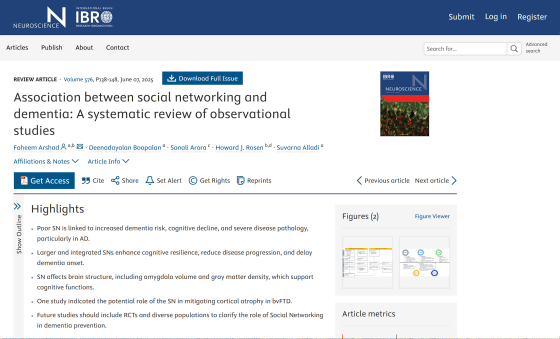Research shows that people with extensive social networks are less likely to develop dementia

Dementia is a disease that causes cognitive decline to the point of interfering with daily life, impairing not only memory but also language, problem-solving, and reasoning abilities, and can also cause changes in personality and behavior. A systematic review of 17 studies involving more than 20,000 subjects found that people with extensive social networks are less likely to develop dementia.
Association between social networking and dementia: A systematic review of observational studies - Neuroscience

Larger social networks associated with reduced dementia risk
https://www.psypost.org/larger-social-networks-associated-with-reduced-dementia-risk/
Previous research suggests that social networking, defined as 'recognizing and maintaining meaningful social connections,' may protect against cognitive decline. Components of these networks include marital status, number of people one contacts, frequency of interactions, relationship satisfaction, and perceived support from others.
A research team led by Faheem Arshad , a neuroscientist at the Global Brain Health Institute (GBHI) , analyzed the results of 17 studies published between 2000 and 2024 to examine the relationship between social networking and dementia.

The study participants ranged in average age from 40 to 90 years old, with six studies conducted in the United States, three in Germany, and two in the United Kingdom. The remaining studies were conducted in China, France, Sweden, Ireland, Iceland, and India. Thirteen of the studies included follow-up periods of one to 15 years, with a total of 20,678 participants.
The analysis consistently found that 'individuals with poorer social networks were more likely to develop dementia during the follow-up period, while individuals with larger and more connected social networks were less likely to develop dementia during the follow-up period.'
Additionally, an analysis of four
People with strong social networks tended to maintain healthier brain structures over time, particularly in the amygdala , a brain region involved in emotions and social behavior.

The research team concluded, 'Our systematic review suggests a strong association between low social networking and an increased risk of dementia and cognitive decline, particularly in patients with Alzheimer's disease. Therefore, larger and more connected social networks may contribute to cognitive resilience and reduced dementia severity.'
It's important to note that the design of the studies analyzed in this systematic review doesn't support a clear causal relationship. Psychology publication PsyPost states, 'While a good social network may protect against dementia, it cannot be ruled out that people with better cognitive abilities may be better able to maintain social connections, which may contribute to the observed association.'
Related Posts:
in Free Member, Science, Posted by log1h_ik







